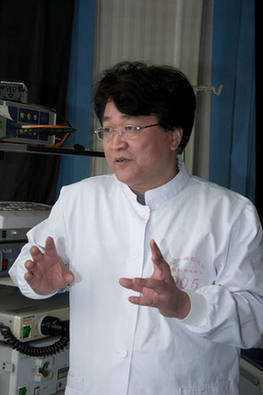| Ex-pathology and the Medical Multiverse
By staff reporter PENELOPE COLVILLE
 |
|
Wang Yongguang wants 21st century international medicine that satisfies foreigners' needs, because it' s good for everybody. |
IT is never more inconvenient to fall ill than in a foreign country. It can feel a bit like having a medical emergency in a public place – lying helpless while someone yells, "Is there a doctor in the house?" There were doctors without borders before Doctors Without Borders, but today's physicians are packing their black bags and heading to China largely to help the foreign population. It isn't just the convenience of patient and doctor sharing the same language; loneliness and homesickness translate into their own spectrum of problems and cares. We have been looking at exceptional foreigners on Chinese soil; this is a nod to the ordinary problems of ordinary foreigners in China regarding health care. Medical care in Chinese hospitals is world-class, but cultural differences call for different bedside manners. The story is much the same for expats everywhere in the world. Dr. Wang Yongguang of Beijing advocates a bio-psycho-social approach to medical care that he believes works well for everyone.
It's the social part of bio-psycho-social that rankles foreign patients. With no public medical centers to speak of, the Chinese visit a GP in a regular hospital setting to have any complaints checked out. Demands on hospitals are escalating all over the world and the Chinese manage their public system well, by all accounts. However, in this family-centered culture, patients come to the hospital with a relative or two to help out, whether for inpatient or outpatient care. The huge population makes for long queues, and in the intake, testing and diagnosis process many queues can be involved – sometimes on different floors: line ups for admission, consultation, x-rays, before booths to give a blood sample or to get a urine bottle, then to different stations to turn in your bodily fluids for analysis, plus a few cashiers to pay for the various services, and one or two counters for prescription filling. Tired yet? The Chinese are philosophical about the supply and demand deficits that often accompany their rapid development. For the foreigner, confusing customs are amusing in a restaurant, but illness tends to expose vulnerabilities and stir up peoples' worst fears. Running the Amazing Race of outpatient consultation procedures, especially if disadvantaged by language differences, the cultural mismatch may provoke anxieties that shake even the most mentally robust.
Then there's the privacy issue. For the Chinese, health care is a personal responsibility, particularly preventive care; everywhere it seems you will find public exercise equipment, and the West would be wise to take a page out of their book. Here, a consultation with a physician is quite matter-of-fact, not a matter of shame or an ordeal requiring so much privacy. But if you don't believe it takes a village to cure what ails you, the lack of privacy in a Chinese outpatient department may make you surprisingly uncomfortable. On a particularly busy day, while the typically hard-working doctor is hearing about your complaint, the next one or two patients will be in the same room or impatiently staring down the doctor from a vantage point just beyond your shoulder.
|
